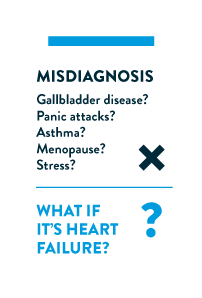All heart failure patients require support from healthcare professionals and family as they are likely to experience dyspnea and anxiety.1 However, women with heart failure are more symptomatic, have more evidence of volume overload, have lower health-related quality of life and greater impairment in their daily activities.2


In addition to the differences in diagnosis and symptoms, women also suffer from more physical and social restrictions due to lack of energy and higher impact of HF on women’s psychological attitude.6 This continues after diagnosis. After 1-year follow-ups, women with HF have lower vitality and physical function than men.6 Fifty percent of women get the wrong treatment.7

MAT-2309440 v2.0